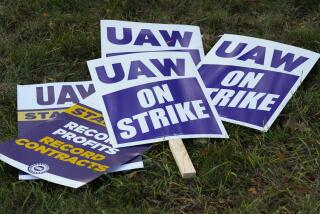Chrysler Will Spend $1 Billion for Detroit Plant : Decaying Neighborhood to Be Razed; New Facility Expected to Save 4,500 Jobs
- Share via
DETROIT — Detroit received a major boost Monday as Chrysler announced plans to spend $1 billion for a huge new truck assembly complex on a site adjacent to the auto maker’s oldest facility.
The project, which should help retain about 4,500 Chrysler jobs in one of the poorest sections of Detroit’s east side, calls for the city of Detroit to demolish an entire neighborhood of decaying homes and businesses near Chrysler’s existing Jefferson Avenue plant in order to make room for the new facility.
In a move reminiscent of the city’s controversial decision to tear down a predominantly Polish neighborhood in order to make room for a new General Motors assembly plant, Detroit plans to raze the east side district and turn over 250 acres of land to Chrysler, city officials said Monday.
Chrysler said the new plant, with an annual production capacity of about 250,000 units, will build a new light truck model beginning in 1991. The old Jefferson plant, which now builds Chrysler’s K-cars and related front-wheel-drive models, will remain in operation while the new plant is under construction next door. It will then be torn down to make room for Chrysler suppliers that might move into the area, according to Gerald Greenwald, chairman of Chrysler Motors, Chrysler’s automotive unit.
Complex Built in 1907
If Chrysler had not replaced the aging Jefferson complex, built in 1907 as the original headquarters for the old Chalmers Motor Car Co., with a new plant in the city, Detroit’s economy might have been devastated. The old Jefferson plant is now one of only three assembly facilities left in the city of Detroit and is the dominant employer on Detroit’s impoverished east side.
Instead, the decision to remain in Detroit has “created the opportunity for turning a whole city around,” an enthusiastic Mayor Coleman A. Young said.
Chrysler Chairman Lee A. Iacocca told a press conference that he had been “committed from the start” to building a replacement for the old Jefferson plant in the city. Chrysler, which has long been the largest private employer in the city, received crucial support from Young in its campaign to win federal loan guarantees during its financial crisis in the early 1980s.
Still, government and labor have made it easy for Chrysler to stay. Michigan will provide $150 million in job training and construction aid, the federal government will provide about $50 million in grants and loans, and the city will condemn and package the land for Chrysler at bargain rates. Meanwhile, the United Auto Workers local that represents the existing Jefferson work force has already agreed to a streamlined labor contract that will apply at the new plant.
“With the right commitment from labor, management and government, there’s no reason you can’t compete with an inner city plant,” Iacocca said. “With the right commitment, there is no reason an inner city plant can’t compete with any ‘green field’ site in Tennessee or Timbuktu.”
Despite the massive scale of the demolition planned for the Chrysler project, however, there has been little opposition voiced by the predominantly black residents of the area. In a heavily industrialized region devastated by crime and unemployment, vacant homes are commonplace and housing values are extremely low.
Unlike the Polish-Americans who fought hard to stop the GM project from taking their neighborhood in Detroit’s Poletown in the early 1980s, the residents around the Jefferson project apparently see an opportunity to sell out to the city at prices far higher than they could get for their homes on the open market.
And Chrysler apparently has learned from GM’s mistakes in Poletown.
“We are not moving any religious facilities,” quipped Greenwald, referring to GM’s hotly disputed efforts to demolish neighborhood churches in Poletown.






